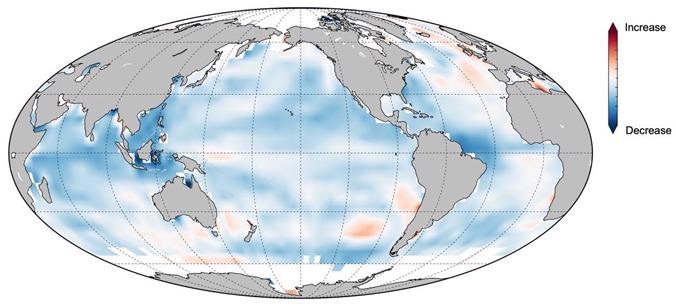Reviewed by Alex SmithMay 9 2022
As a result of global warming, the world’s ocean has been subjected to the consistent loss of its year-to-year memory, according to a study reported and co-authored by an atmospheric researcher at the University of Hawaiʻi at Mānoa.
 Declining ocean memory (blue) between now and end of the 21st century. Image credit: Shi et al. 2022.
Declining ocean memory (blue) between now and end of the 21st century. Image credit: Shi et al. 2022.
The study has been reported in the Science Advances journal.
The research group discovered this by evaluating future projections from the latest generation of Earth System Models.
Making a comparison with the quick weather fluctuations of the air, the gradually altering ocean displays powerful persistence, or so-called “memory.” This implies that the ocean temperature tomorrow is likely to look a lot like it does at present, with some little changes. Consequently, ocean memory is frequently utilized for forecasting ocean conditions.
Throughout the climate models, ocean memory loss was discovered as a joint response to human-induced warming. Since greenhouse-gas concentrations are on the constant rise, such a loss in memory will become more obvious.
We discovered this phenomenon by examining the similarity in ocean surface temperature from one year to the next as a simple metric for ocean memory. It’s almost as if the ocean is developing amnesia.
Hui Shi, Study Lead Author and Researcher, Farallon Institute
It has been found that ocean memory is connected to the thickness of the ocean’s uppermost layer, called the mixed layer. Deeper mixed layers exhibit higher heat content, which gives more thermal inertia that translates into memory.
But the mixed layer over the majority of the ocean will become shallower in reaction to ongoing anthropogenic warming. This leads to a fall in ocean memory.
New Challenges for Ocean Predictions
Together with ocean memory fall, the thinning mixed layer is also known to increase the random fluctuations of the sea surface temperature. Consequently, even though the ocean will not become highly variable from one year to the next in the future, the fraction of useful signals for forecast greatly decreases.
Reduced ocean memory together with increased random fluctuations suggest intrinsic changes in the system and new challenges in prediction under warming.
Fei-Fei Jin, Study Co-Author and Professor, Atmospheric Sciences, Mānoa School of Ocean and Earth Science and Technology, University of Hawaii
Impacts on Ocean Management and More
No impacts have been caused by ocean memory loss in the forecast of physical variables. However, it can impact the approach to managing sensitive marine ecosystems.
As far as fisheries management is concerned, the biological parameters utilized for stock evaluation are calculated assuming a stable surrounding represented by the recent past. Decreased ocean memory may render such evaluation inaccurate and needs new methods in ecosystem-based fisheries management to comprise real-time ocean monitoring and other efforts alike.
Also, ocean memory fall probably exerts effects on populations of biological resources. Based on whether the species have been adapted to constant or more variable environmental conditions, future changes in their population could be better evaluated and forecasted by taking ocean memory loss into account.
Apart from ocean prediction, predicting land-based impacts on temperature, precipitation and extreme events could also be impacted by ocean memory fall as a result of their dependence on the existence of sea surface temperature as a predictability source.
As ocean memory continues to fall, scientists will probably be challenged to search for substitutive predictors for skillful predictions.
Journal Reference:
Shi, H., et al. (2022) Global decline in ocean memory over the 21st century. Science Advances. doi.org/10.1126/sciadv.abm3468.